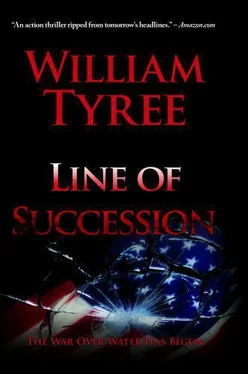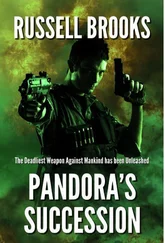William Tyree - Line of Succession
Здесь есть возможность читать онлайн «William Tyree - Line of Succession» весь текст электронной книги совершенно бесплатно (целиком полную версию без сокращений). В некоторых случаях можно слушать аудио, скачать через торрент в формате fb2 и присутствует краткое содержание. Год выпуска: 2010, Издательство: Massive Publishing, Жанр: Триллер, на английском языке. Описание произведения, (предисловие) а так же отзывы посетителей доступны на портале библиотеки ЛибКат.
- Название:Line of Succession
- Автор:
- Издательство:Massive Publishing
- Жанр:
- Год:2010
- ISBN:нет данных
- Рейтинг книги:3 / 5. Голосов: 1
-
Избранное:Добавить в избранное
- Отзывы:
-
Ваша оценка:
- 60
- 1
- 2
- 3
- 4
- 5
Line of Succession: краткое содержание, описание и аннотация
Предлагаем к чтению аннотацию, описание, краткое содержание или предисловие (зависит от того, что написал сам автор книги «Line of Succession»). Если вы не нашли необходимую информацию о книге — напишите в комментариях, мы постараемся отыскать её.
Line of Succession — читать онлайн бесплатно полную книгу (весь текст) целиком
Ниже представлен текст книги, разбитый по страницам. Система сохранения места последней прочитанной страницы, позволяет с удобством читать онлайн бесплатно книгу «Line of Succession», без необходимости каждый раз заново искать на чём Вы остановились. Поставьте закладку, и сможете в любой момент перейти на страницу, на которой закончили чтение.
Интервал:
Закладка:
He could see the Holy Grace Baptist clock tower in the distance. It was there, he was told, that Congressman Bailey would be attending the 11:00 a.m. service today. Speers’ plan was to slip in late, sit in the back, and approach Bailey afterwards.
How to approach Bailey was another matter. Speers’ objective was to find out why the most powerful man in Congress would make time to speak directly with a simple army Lieutenant. The way he saw it, Bailey was unlikely to spill his guts. That was okay by Speers. All he wanted was an indicator. If Bailey denied talking to Lieutenant Flynn altogether, or pretended not to know who he was, then Bailey was likely in cahoots with him. If he admitted to knowing Bailey, then Speers would fact-check whatever he said.
“One quarter-mile to destination,” the nav system said.
Suddenly a Ford F-450 pulled out from the curb, nearly broadsiding him.
“Asshole!” Speers shouted out the open car window, but the truck barreled ahead, running the red light and picking up speed as it went through the small-town intersection. “So much for Sunday drivers.”
*
Holy Grace sat at the end of the small but bustling retail district, forming the T at the end of Main Street. From its pulpit, the Reverend Jimmy Swaggart himself had once stood denouncing rock and roll as the devil’s music. The deacon opened the sanctuary doors, releasing the organist’s sweeping call to worship as the last of the flock trickled in. He saw the heat fumes rising from the asphalt and felt the sweat trickle down his sideburns, into the collar of his white starched shirt.
Congressman Bill Bailey’s black sedan pulled up to the space reserved for the church’s most generous donor. The deacon grinned, knowing how pleased the reverend would be to know that the congressman was in services today.
“Hey Dale,” Congressman Bailey yelled when he stepped out of the car. “How’s your shoulder?”
“It’s a-talkin’ to me, Mister Speaker,” the deacon shouted back. He had once called him Bill, decades ago, when Bailey was a mere junior congressman who still ran a machine shop in his spare time. Now he had risen to be Speaker of the House, just two steps from the Presidency. A man that powerful couldn’t just go by Bill.
He helped the Speaker’s wife, Gladys Bailey, up the steps and handed her a program. “Any luck wettin’ a line?” he said as they stepped inside.
“The bass are slow. The heat, I reckon. We might try crawdads.”
They never heard the Ford F-450 coming.
*
Faruq Ahmed accelerated to 65 mph. In a move he had practiced time and again in the preceding weeks, he jerked the steering wheel to the right at the last possible moment and sent the truck skiing up the church’s wheelchair ramp, passenger-side wheels clearing the front steps. The truck went briefly airborne and sailed through the church’s double front doors.
*
Speers felt the church blast in his rental car from five blocks away. His windshield filled with white light and the car bounced on its shocks. A cloud-like expanse of black smoke billowed before him.
He stepped out of the car. A piece of insulation hit him in the forehead. It felt more like a brick than a four-ounce piece of cauterized foam.
“C’mere,” someone said. A liver-spotted hand gripped his bicep. Speers touched his own forehead and felt blood. The next thing he knew, he was standing in a storefront doorway next to an elderly man in a white suit. Chunks of smoking debris fell around them.
“That’s my church,” the man said. “That’s my church.”
Speers’ face fell even further. “That’s Holy Grace? Congressman Bailey’s…”
“Yessir. The Speaker hisself. I saw his car pass by just a minute ago.”
As Speers ran back toward the rental car, he held a newspaper over his head to shield himself from the ensuing particle rain. Once back inside, he switched on the windshield wipers to clear the ash from his view. He flipped a U-Turn and drove back down Main Street, honking as he drove through the fast-gathering crowd.
Shaw Air Force Base, South Carolina
11:02 a.m.
Major Cleveland Dobbs was halfway through his shift at CENTAF, the nerve center for the Eastern U.S strategic air defense. The burly, mustachioed officer sat at his terminal at the top of the CENTAF command room, an amphitheatre-shaped room about the size of a movie theatre. It was here that Dobbs supervised eighteen air traffic controllers who in turn coordinated over a hundred coastal fighter patrols in a single shift. Since 9/11, fighter aircraft were constantly in proximity to every major U.S. airport. Keeping them clear of mid-air collisions in the increasingly crowded skies was a tough job. Dobbs spent most of his day actively monitoring the work of his rather green staff. At a cost of between thirty and fifty million dollars per aircraft, there was no room for error.
His headset crackled as the Secret Service special agent aboard Marine One — the President’s personal helicopter — hailed him. “CENTAF, this is Dynasty requesting a flight plan.” For security reasons, it was protocol for the duty officer to manage Marine One and Air Force One personally. Marine One departure flight times were strictly classified; they happened unannounced, and flight plans were randomly generated by CENTAF on the fly. Helicopters, even the latest VH-71 Kestrels that Marine One flew, were simply too easy to shoot down to risk any security leaks.
“Copy that, Dynasty,” Dobbs replied over his headset. “Verify destination.”
“Red Zone,” the Secret Service agent said, giving the current destination codename for Camp David, the longtime Presidential retreat in Frederick County, Maryland. The flight between the White House and Camp David was a short one, and there were eight randomized flight paths varying between nineteen and twenty-six minutes in duration. The algorithm by which the CENTAF computers determined the route was a mystery, even to Major Dobbs. He had simply been trained to log into the Marine One application, list “Red Zone” as the destination, and click a button marked “GENERATE.” The computer would chew on it for less than one-tenth of a second and display the route to Dobbs.
The codename appeared on his screen. “The flight plan is Slasher,” Dobbs said. “Slasher.”
“Copy that CENTAF,” came Marine One’s reply. The pilots had each of the routes committed to memory. No written or electronic flight plans existed.
Flight plan Slasher took Marine One due north, where it would be joined in mid-air by three identical VH-71 Kestrels all bearing the Marine One paint and insignia. These helicopters were decoys. The choppers flew in a pattern that was similar to cards shuffling in and out of a deck. From the ground, it was virtually impossible to tell which chopper carried the President.
Precisely one minute later, Dobbs tracked a pair of F-35s launched out of Langley to enforce the six-mile no-fly radius that was enforced around Camp David when the POTUS was in residence. A former combat chopper pilot himself, Dobbs viewed this as critical, since there were typically dozens of civilian aircraft that unwittingly penetrated Camp David airspace each year. From the moment the escorts joined the group, it would be only minutes before the entire group cleared the I-495 beltway and flew at low altitude over the rolling hills of Maryland.
The route now set, Major Dobbs removed his headset and looked over his crew. He frowned at the less than bumper crop of controllers. Most of these recruits had been in less than a year. Some were trainees that had no business here. All the experienced controllers were either on duty overseas or aboard aircraft carriers and AWACS planes. Still others had left to work for Ulysses. CENTAF was stretched thin, just like everyone else in the military.
Читать дальшеИнтервал:
Закладка:
Похожие книги на «Line of Succession»
Представляем Вашему вниманию похожие книги на «Line of Succession» списком для выбора. Мы отобрали схожую по названию и смыслу литературу в надежде предоставить читателям больше вариантов отыскать новые, интересные, ещё непрочитанные произведения.
Обсуждение, отзывы о книге «Line of Succession» и просто собственные мнения читателей. Оставьте ваши комментарии, напишите, что Вы думаете о произведении, его смысле или главных героях. Укажите что конкретно понравилось, а что нет, и почему Вы так считаете.












